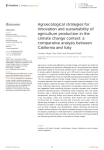Negri L., Bosi S., Dinelli G. (2025). Agroecological strategies for innovation and sustainability of agriculture production in the climate change context: a comparative analysis between California and Italy. Frontiers in Agronomy, 01/01/2025, vol. 7, p. 1536997.
https://doi.org/10.3389/fagro.2025.1536997
https://doi.org/10.3389/fagro.2025.1536997
| Titre : | Agroecological strategies for innovation and sustainability of agriculture production in the climate change context: a comparative analysis between California and Italy (2025) |
| Auteurs : | L. Negri ; S. Bosi ; G. Dinelli |
| Type de document : | Article |
| Dans : | Frontiers in Agronomy (vol. 7, 2025) |
| Article en page(s) : | p. 1536997 |
| Langues : | Anglais |
| Langues du résumé : | Anglais |
| Catégories : |
Catégories principales 06 - AGRICULTURE. FORÊTS. PÊCHES ; 6.4 - Production Agricole. Système de ProductionThésaurus IAMM AGRICULTURE ; AGROECOLOGIE ; SYSTEME DE PRODUCTION ; CHANGEMENT CLIMATIQUE ; ANALYSE COMPARATIVE ; CALIFORNIE ; ITALIE |
| Résumé : | Agriculture is profoundly affected by climate change, with regions like California and Italy experiencing significant challenges due to rising temperatures, altered precipitation patterns, and extreme weather events. Climate change is expected to reduce yields of specialty crops by up to 30% due to lower productivity and crop failure. To cope with climate change, farmers need to modify production and farm management practices, especially adopting agroecological principles. This mini-review explores climate change impacts on agriculture through an innovative approach that seeks to compare possible response strategies in two distant regions, California and Italy, which share similar climate conditions and crops. California's agriculture, renowned for its specialty crops like nuts, fruits, and vegetables, faces intensifying droughts, reduced snowpack, and increased potential evapotranspiration, threatening water availability and crop yields. Similarly, Italy, a Mediterranean climate change hotspot, endures higher temperatures, declining rainfall, and frequent extreme events, impacting key crops like grapes, olives, and tomatoes. Both regions see vulnerabilities compounded by climate-induced pest pressures and water scarcity. Agroecology emerges as a promising solution to mitigate these impacts by enhancing soil health, conserving water, and promoting biodiversity. Practices such as cover cropping, crop diversification, organic mulching, and precision irrigation bolster resilience. Site-specific strategies and policy support are crucial for adoption, especially in small-scale farms. Collaborative knowledge-sharing between California and Italy can foster innovative solutions, ensuring sustainable and resilient agricultural systems in the face of climate change. |
| Cote : | En ligne |
| URL / DOI : | https://doi.org/10.3389/fagro.2025.1536997 |







